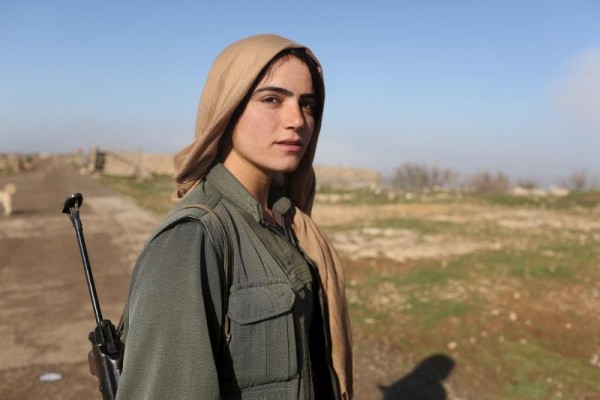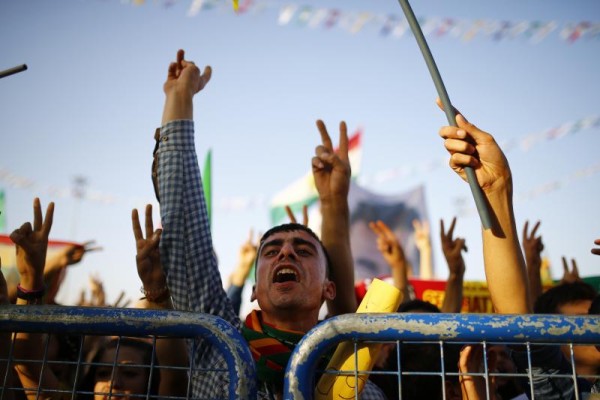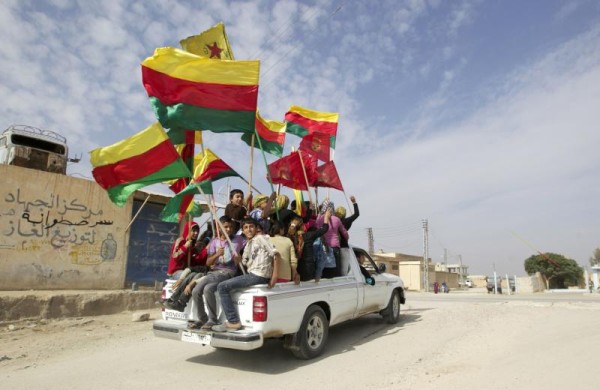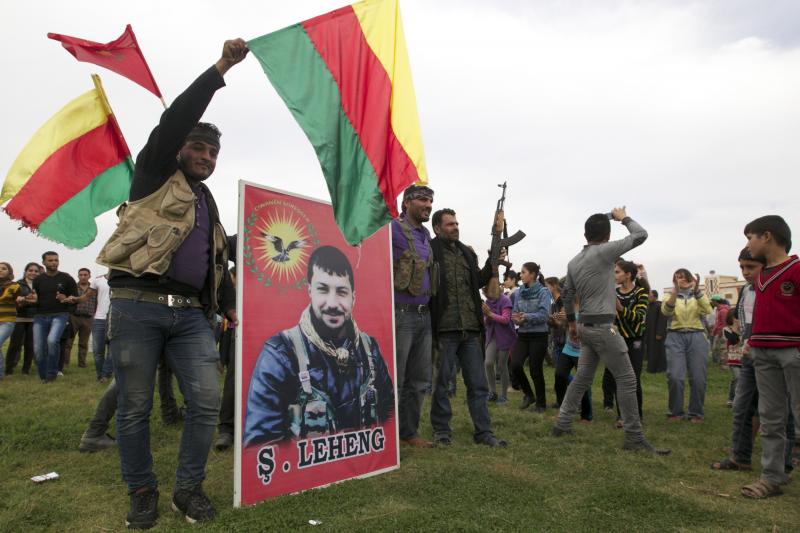PBS: Escaping Eritrea … [Read More...] about ካብ ውሽጢ ቤት ማእሰርታት ኤርትራ
Rojava’s Witness: The Kurds and Ankara’s Real Strategic Nightmare
Micha’el Tanchum, 5 August 2015, Foreign Affairs
As most observers predicted, Turkey’s campaign against the Islamic State (also called ISIS) has quickly become a cat’s-paw for a war against the outlawed Kurdistan Workers’ Party (PKK). Whereas Turkey’s July 23 assault on ISIS involved a single sortie against a small cluster of targets in Syria, from July 24 to July 26 the Turkish air force conducted over 150 sorties against more than 300 PKK targets in Iraq. And, as of July 30, whereas the Turkish military had killed somewhere around nine ISIS fighters, it reportedly killed 190 PKK militants and wounded over 300.

The goal of Turkish President Recep Tayyip Erdogan and his AKP government is clear. They want to unravel the partnership between the PKK-affiliated Democratic Union Party (PYD) and the United States. U.S.-supported PYD victories against ISIS have enabled the party to build a contiguous stretch of territory in northern Syria, which runs from Kobani to the Iraqi border. Facing the prospect of the PYD joining its third canton to this corridor to form an autonomous Kurdish region, called Rojava, along Turkey’s southern border, Turkey’s president had to act.
Erdogan’s recent campaign has already achieved some immediate tactical success, notably in the form of Washington’s assent for Turkey’s creation of an “ISIS-free zone” in northwestern Syria. But the AKP’s attempt to drive a wedge between the United States and the PYD may prove a strategic blunder, dangerously eroding Turkey’s already weak position in Syria and Iraq. Indeed, Turkey’s initiative will likely turn the Islamist rebel group Jabhat al-Nusra into northwest Syria’s leading force, providing Nusra’s Saudi and Qatari patrons a foothold on Turkey’s border. Worse still, the PYD and the PKK could strike an alliance with Iran, bringing about the strategic nightmare that Ankara fears most: a PKK-led Kurdish entity spanning Syria and Iraq that would be ready to do Tehran’s bidding.
KURDISH CONUNDRUM
The U.S.-Kurdish alignment that followed ISIS’ June 2014 invasion of Iraq has vexed Ankara. At first, the United States limited its partnership to the Iraqi Kurdish Regional Government’s peshmerga forces. This group, however, quickly proved incapable of preventing ISIS from overrunning Kurdish populated areas in Iraq’s disputed territories. And soon the PKK’s seasoned guerrilla fighters joined in the battle, forming an essential component of the U.S.-backed campaign to drive ISIS from Iraq (even though, officially, the United States considers the PKK a terrorist group and works only with the PYD).
Embracing the cause of Rojava as their own, millions of conservative Kurds switched their allegiance from Erdogan’s ruling AKP to the Kurdish-led People’s Democratic Party (HDP). The PKK was instrumental in the recapture of Makhmur in August 2014, one of the anti-ISIS coalition’s first victories. Makhmur is home to over 10,000 Kurdish refugees who had fled Turkey in the 1990s. PKK fighters and their PYD comrades also broke ISIS’ siege of Mount Sinjar in northwestern Iraq near the Syrian border in August 2014, rescuing thousands of besieged Yezidis from ISIS militants. And so, in just a few moves, the Kurds had built up a sizable corridor of territory outside of the Iraqi Kurdish Regional Government’s formal boundaries.

To support the PYD/PKK ground operations in Mount Sinjar, the United States had conducted airstrikes. To Turkey’s dismay, the United States subsequently expanded its cooperation with the Kurds to Syria, assisting the Kurdish effort to break ISIS’ siege of the autonomous Kurdish canton of Kobani with American airpower. On October 18, 2014, as the PYD chair, Salih Muslim, met with the U.S. deputy national security adviser, Tony Blinken, to formalize cooperation, Erdogan infamously equated the PYD and ISIS. The remarks astounded Turkey’s Kurds and failed to derail the U.S.-PYD partnership.
The PYD’s subsequent victory in January over ISIS in the Syrian city of Kobani became a defining political moment for Kurds across the border in Turkey. Embracing the cause of Rojava as their own, millions of conservative Kurds switched their allegiance from Erdogan’s ruling AKP to the Kurdish-led People’s Democratic Party (HDP).The AKP lost its majority, and Erdogan’s dream of changing the Turkish constitution to create his “Turkish-style” presidential system slipped away.
Things got worse for Erdogan in June when the PYD defeated ISIS in the Syrian town of Tel Abyad, the last link in the chain between Kobani and the Iraqi border. In other words, Rojava was half complete. Turkey now faced the intolerable possibility that the PYD would build the last part of it by expelling, with U.S. air support, ISIS from territory west of the Euphrates River. The July 20 ISIS suicide bombing against a Kurdish target on Turkish soil and the PKK’s summary executions of two Turkish police officers whom the group accused of complicity with ISIS provided the AKP government the pretext it needed to launch campaigns against ISIS and the PKK.
In the last week, Turkey has halted the PYD’s westward advance. The PKK’s subsequent terrorist attacks within Turkey have put a strain on the PYD’s working relationship with the United States. And Ankara’s decision to open Incirlik air base to U.S. combat aircraft has also secured Washington’s buy-in to Turkey’s initiative. The base is about around 116 miles from Aleppo, so fighter jets leaving Incirlik can make it to Syria’s conflict zone in approximately 12 minutes. That helps the United States more effectively support anti-ISIS forces on the ground. In return for opening the base, Ankara won Washington’s support for the creation of an “ISIS-free zone” along a 62-mile stretch of the Turkish-Syrian border that extends about 25 miles deep into Syrian territory. U.S. and Turkish airpower will secure the zone from above. Yet-to-be-specified moderate anti-Assad forces will police it from the ground.

Before the PYD and the United States started working together, acting PKK political leader Cemil Bayik had openly expressed his preference for Tehran. This so-called safe zone is precisely the territory that the PYD needs to connect the Kurdish territories around Kobani to the Kurdish territories in the West. In other words, Turkey’s safe zone seems aimed more at preventing the PYD’s unification of Rojava than neutralizing jihadist activity. After all, there are no moderate forces capable of controlling this zone aside from the PYD. The only effective fighting force in the area is the al Qaeda–affiliated Nusra and associated Salafi militias that have formed a coalition called Ansar al-Sharia.
Turkey’s apparent plan to install a collection of rival Islamist and non-Islamist militias in northwest Syria is a recipe for further instability. Without Turkish ground forces to manage the internecine strife, Ankara’s initiative would likely only trade an ISIS-controlled zone for a Nusra-controlled one, benefitting Turkey’s rivals Qatar and Saudi Arabia. Either way, an emboldened Nusra would likely prove unmanageable for Turkey. Even worse for Ankara, it would push the PKK to align with Iran.
IN WITH IRAN
A PKK alliance with Iran is not without precedent or political logic. Before the PYD and the United States started working together, acting PKK political leader Cemil Bayik had openly expressed his preference for Tehran. His reasoning was that Iran’s support for the Shia government in Baghdad and the Alawite government in Damascus was more aligned with the PKK’s own goals than working with a Turkish government that was abetting ISIS and al Qaeda against Kurdish forces in northern Syria. At the time, Bayik’s position enjoyed significant support among PKK and PYD forces fighting on the ground.
In eastern Iraqi Kurdistan, PKK/PYD fighters assisted the Tehran-backed Patriotic Union of Kurdistan (PUK) in its battle against ISIS in Diyala province near the Kurdish town of Khanaqin on the Iranian border. Eventually Iranian soldiers and fighters from Iran’s 81 Armored Division, which is stationed directly across from Khanaqin, joined in the effort to drive out ISIS.

The PUK and a PUK-breakaway group, the Gorran party, command significant support in Iraq’s disputed Kurdish territories. And both enjoy good relations with the PKK. In contrast to Kurdish Regional Government President Masoud Barzani, who recently requested that the PKK withdraw from Iraq so that Turkey would stop bombarding his territory, the PUK roundly condemned Turkey’s airstrikes and Gorran called on Barzani to adopt a tougher posture toward Ankara. If the United States ever abandoned the PYD, the PKK could form an alliance with the PUK and Gorran, creating an Iranian-backed Kurdish zone that would extend from the Iranian border in Khanaqin via Makhmur and Sinjar in Iraq to PYD-controlled Rojava. The PUK-dominated oil-rich city of Kirkuk would be at the center of this Khanaqin-to-Kobani Kurdish entity. It is unclear, of course, whether the United States will abandon the PYD. Washington certainly sees the Kurds as a valuable hedge against ISIS, but Turkey is a key NATO member on which the United States is counting to counterbalance Iran. It might be that the United States will tacitly allow Turkey to degrade Rojava, which would, in effect, be a de facto abandonment of the PYD.
The PKK seems to have already pushed its Iranian affiliate PJAK to work toward détente with the Iranian government. This directive, mirroring the PKK’s two-year unilateral cease-fire with Turkish state, seems designed to keep the PKK and Iran on decent terms. Not hurting is the fact that many PJAK fighters have left Iran to assist in the defense of Rojava. In recent months, Tehran has adopted a more conciliatory line toward its Kurdish minority, including raising the prospect of limited language rights. And on July 26, Iranian President Hassan Rouhani made his first visit to Iranian Kurdistan and declared that Tehran was committed to protecting all of the Middle East’s Kurds from ISIS and al Qaeda.
Many leaders in the Sunni Middle East are already fretting over Iran’s rising regional influence; a Kurdish-Iranian alignment would provide Tehran with more widespread influence in Iraq and Syria, fundamentally altering the region’s geopolitical chessboard. An Iranian-empowered, PKK-led Kurdish entity spanning Syria and Iraq would also prove a much more intractable problem for Turkey than the current PYD-controlled Rojava. Worse still, with Ankara already having trouble exerting its authority in Turkey’s southeastern Kurdish regions, a PKK-Iranian alignment would turn Tehran into an influential force across a quarter of Turkey’s territory.
Having lost the Kurdish vote in Turkey’s June 7 parliamentary elections, Erdogan and the AKP now seek to restore their majority by attracting right-wing nationalist voters in what could be a November 2015 rerun of Turkey’s parliamentary elections. Abandoning the Kurdish peace process, the AKP’s gambit may lead to a protracted domestic conflict. Turkey’s reversion to hard-line anti-Kurdish policies from a bygone era will likely damage the country’s standing and its strategic interests, since the geopolitical landscape of its region has changed. Ankara’s offensive against the PKK is an invitation to Iran to bring about a strategic nightmare for Turkey worse than the one Erdogan sought to prevent.
